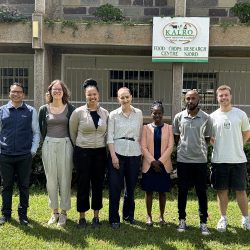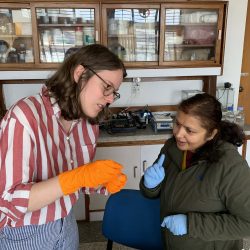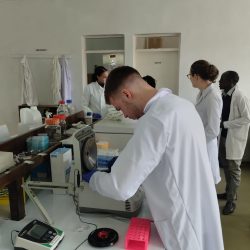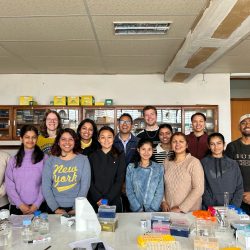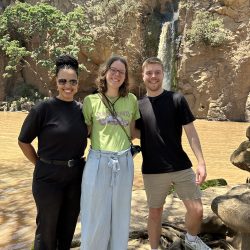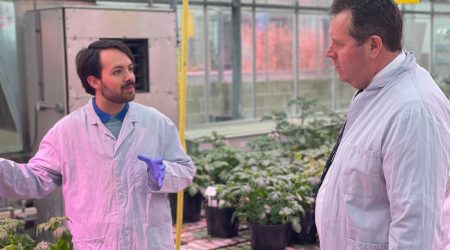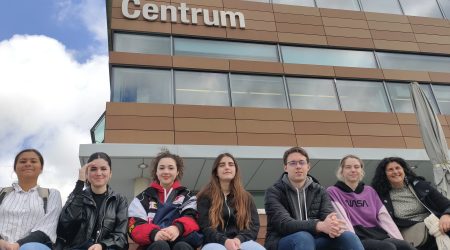PhD Students deliver molecular biology training in Kenya and Nepal
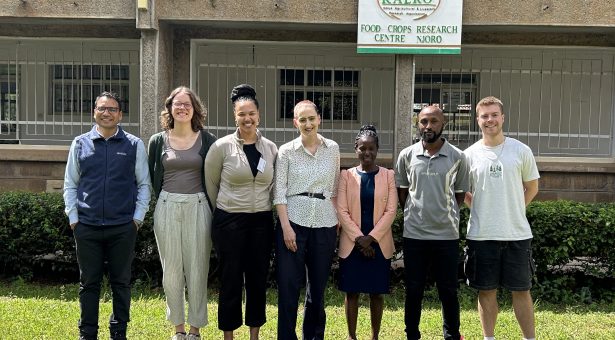
Earlier this year, in January 2024, three PhD students journeyed from Kenya to Nepal for their professional internship placements (PIPS) with MARPLE diagnostics, empowering scientists with essential molecular biology skills in a collaborative effort to strengthen local agricultural research centres.
The John Innes Centre team of NRPDTP students, Cesaree Morier-Gxoyiya, Delfi Dorussen, and Tom Lock embarked on an eight-week global mission in tandem with the MARPLE (Mobile And Real-time PLant disEase) diagnostics project. Their task: to train scientists in Kenya and Nepal in essential molecular biology techniques and increase scientific capacity at crop research hubs.
This collaboration between JIC and partner organisations in Kenya and Nepal aimed to bolster in-country scientific expertise and provide support to effectively implement the MARPLE diagnostics pipeline.
Tom said, “We are extremely fortunate to have had this once in a lifetime opportunity to travel around the world and deliver training in molecular biology. This unique PIPS placement allowed us to grow not only as researchers but also gain invaluable life experiences that will stay with us forever.”
The MARPLE diagnostics project, a global initiative aiming to provide real-time, point-of-care plant disease diagnostics and surveillance for wheat rusts, has several hubs worldwide. These include the Kenyan Agriculture and Livestock Research Organisation (KALRO) in Njoro, Kenya, and the Nepal Agricultural Research Council (NARC) in Kathmandu, Nepal. The students’ placement was an important step in improving the scientific capacity in these regions, helping to accelerate the global impact of the MARPLE project.
Starting their placement in mid-January 2024, the students arrived at KALRO Njoro, a few miles from the city of Nakuru. This centre for crop research primarily focuses on crop improvement through marker-assisted breeding and has a plant pathology department that aims to monitor and characterise emerging crop diseases in Kenya.
Under the leadership of centre director Dr Godwin Macharia, the many talented scientists at KALRO are undertaking pioneering plant pathology research on the front line of crop diseases threatening Kenyan agricultural systems.
Godwin noted, “Having the students on placement with us at KALRO was a fantastic opportunity to share new ideas and perspectives and continue to build on our long-standing link between our institutes”.
During their placement, the PIPS students had the opportunity to participate in a MARPLE diagnostics workshop delivered by Professor Diane Saunders, the project co-lead, and Dr Oscar Gonzalez from JIC, along with Dr Zennah Kosgey and Cyrus Kimani from KALRO Njoro.
This workshop brought together researchers from the MARPLE diagnostics hubs in Kenya, Nepal, and Ethiopia. They received training on the techniques required to carry out the MARPLE diagnostics protocol independently. Additionally, they discussed any issues encountered and engaged in horizon scanning for potential future activities.
After six weeks of delivering molecular biology training, running workshops, and providing hands-on technical support with ongoing projects, the PIPS students left Kenya for Nepal, arriving in late February. Although this visit was shorter, the students had the same goal for this two-week leg of the trip – to improve the scientific capacity at NARC by training scientists in molecular biology techniques.
Cesaree remarked, “Our time in Nepal was truly enriching, working alongside dedicated scientists in such a vibrant research environment, engaging in a wide variety of research projects.”
The students worked closely with Dr Ram Khadka and his talented team of over 20 students on various projects, including research on citrus greening bacteria, root-knot nematodes, rice blast, and wheat yellow rust. Although challenging at times, this work was incredibly rewarding for both the PIPS students and the host organisations, highlighting the potential of international collaboration for technical capacity building in countries with limited scientific resources and access to practical training.
The next step is to explore further opportunities to support more JIC students (and beyond) to participate in such enriching opportunities; continuing to strengthen the knowledge, skill base and expertise in plant and microbial science across our organisations.
Cesaree, Delfi and Tom are funded by the BBSRC Norwich Research Park Biosciences Doctoral Training Partnership (NRPDTP).
These professional internship placements were funded by a BBSRC Excellence with Impact award to the JIC, and a BBSRC Innovator of the Year Award in the international category awarded to Professor Diane Saunders and Dr Dave Hodson (CIMMYT).
With additional support provided by the BBSRC funded Norwich Research Park Biosciences Doctoral Training Partnership.

